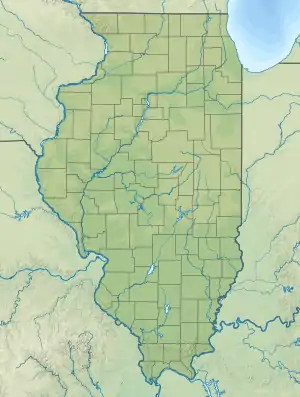Lake Bloomington
Lake Bloomington is located in Hudson, Illinois, United States. Lake Bloomington is a man-made lake, the original purpose of constructing the lake was to supply Bloomington-Normal with a reliable, primary source of water. Lake Bloomington is fed by Money Creek, whose water source is mostly field runoff from around the Towanda area. There was a need for this water supply, extensive research and construction resulted in the project costing more than the expected amount. The lake has 635 acres (257 ha) and 18.5 miles (29.8 km) of shoreline. =[1] undefined />. The average depth of the lake is 14.5 feet (4.4 m). The maximum horsepower of motor boats is 40 HP, with a maximum speed of 25 MHP.[2] Crappie fishing is very good with most fish under 10".[3] Fish Limits:[4]
FISH SIZE CREEL LIMITS Large and Smallmouth Bass Minimum 15” 3 per day Walleye Minimum 18” 3 per day Northern Pike Minimum 24” 3 per day Hybrid Striped Bass 10 fish daily harvest limit with no more than 3 fish greater than or equal to 17" White, Black or Hybrid Crappie No Minimum Length 15 per day Bluegill or Redear Sunfish No Minimum Length 25 per day
| Lake Bloomington | |
|---|---|
 Lake Bloomington | |
| Location | McLean County, Illinois |
| Coordinates | 40°39′41″N 88°56′10″W |
| Type | man-made lake |
| Primary inflows | Money Creek |
| Surface area | 635 acres (257 ha) |
| Average depth | 14.5 feet (4.4 m) |
| Shore length1 | 18.5 miles (29.8 km) |
| 1 Shore length is not a well-defined measure. | |
History
The first meeting to talk about making this water source was held in the 1920s. The meeting included about 10 members. It was held at Bloomington City Hall. Egbort Hawk took control of the commission to create Lake Bloomington. The council decided to put out a survey to the people asking who would use the lake for recreational purposes such as swimming, fishing, family activities etc. About 8,500 people responded to the survey saying they would benefit from the lake. L. E. Baker owned the land, and sold it to the City Council so the lake could be built. He sold the land per acre at a price of $185 and over 1,200 acres were purchased by the council. The city had to controversially cut down over 50,000 trees to build the lake. Some records suggest they cut down more than what the City Council told the public. The workers used bonfires to clear the dried brush, but the logs were taken out by train. About twenty different species of fish were transported to Lake Bloomington after construction. Some of the fish species were endangered and were transported to the lake in hope of increasing the population. Lake Bloomington was finished on April 1930. By fall, the full opening of the lake was celebrated along with the 100th birthday of McLean County. The official formal dedication was on August 31, 1930. Slightly less than 30% of the visitors were not from Bloomington.
References
- "Lake Bloomington". Lake Bloomington. Retrieved 2015-01-25.
- "Lake Rules". Lake Bloomington Association. Retrieved 2020-01-20.
- "Lake Profile -- BLOOMINGTON, LAKE". IDNR Illinois. Retrieved 2015-01-25.
- "Fishing | City of Bloomington, Illinois". City of Bloomington. Retrieved 2020-01-20.